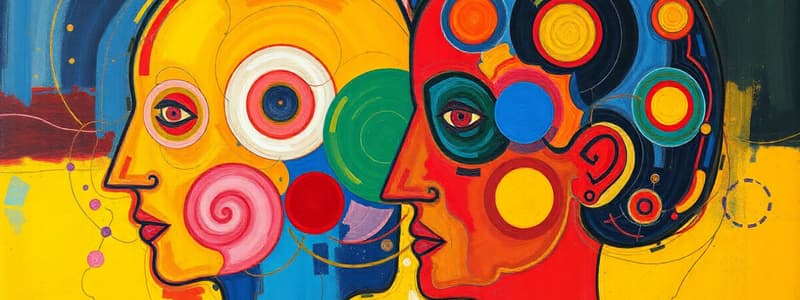Podcast
Questions and Answers
Who is recognized as the father of modern psychology?
Who is recognized as the father of modern psychology?
- William James
- Wilhelm Wundt (correct)
- Carl Rogers
- Sigmund Freud
What method did Wilhelm Wundt pioneer for examining psychological processes?
What method did Wilhelm Wundt pioneer for examining psychological processes?
- Functionalism
- Introspection (correct)
- Behaviorism
- Experimental psychology
In what year did Wilhelm Wundt publish his influential textbook, Principles of Physiological Psychology?
In what year did Wilhelm Wundt publish his influential textbook, Principles of Physiological Psychology?
- 1881
- 1887
- 1874 (correct)
- 1879
What significance does the year 1879 hold in the context of psychology?
What significance does the year 1879 hold in the context of psychology?
What was the primary focus of Wilhelm Wundt's experimental methods?
What was the primary focus of Wilhelm Wundt's experimental methods?
What is dualism in the context of psychology?
What is dualism in the context of psychology?
Which form of monism argues that only physical processes exist?
Which form of monism argues that only physical processes exist?
What phenomenon describes how one side of the brain controls the opposite side of the body?
What phenomenon describes how one side of the brain controls the opposite side of the body?
Which debate addresses whether traits are primarily inherited or shaped by environmental factors?
Which debate addresses whether traits are primarily inherited or shaped by environmental factors?
In the early 1700s, what idea was related to the observation of brain damage and its effects on behavior?
In the early 1700s, what idea was related to the observation of brain damage and its effects on behavior?
Who is often regarded as the father of modern psychology?
Who is often regarded as the father of modern psychology?
What area of study is closely related to the emergence of psychology as a science?
What area of study is closely related to the emergence of psychology as a science?
What does the concept of localization of functions suggest?
What does the concept of localization of functions suggest?
Flashcards are hidden until you start studying
Study Notes
Early History of Psychology
- Origins of psychology date back to Greek philosophers, especially Aristotle who explored topics like memory, sleep, senses, and dreams around 300 BC.
- René Descartes introduced the concept of dualism, positing that the mind and brain are separate entities, influencing ongoing psychological discussions.
- Monism contrasts dualism, asserting the existence of only one type of entity; includes three forms:
- Materialism: Only the physical brain exists, with mental processes as products of brain activity.
- Mentalism: Only the mind exists, with physical reality being a construct of the mind.
- Identity Position: The universe encompasses both material and mental entities as one.
- The Nature vs. Nurture Debate examines whether human traits are innate (nature) or shaped by environment (nurture).
- Psychology emerged as a scientific discipline closely tied to advances in physiology, the study of living organisms' functions.
- In the 1600s, Biological Psychology or Physiological Psychology began focusing on the relationship between the brain and behavior.
- Early 1700s saw the discovery of contralateral control, where damage to one brain hemisphere affects the opposite body side.
- By the 1800s, the concept of localization of functions became prominent, arguing that specific brain areas govern specific functions.
Wilhelm Wundt: The Father of Modern Psychology
- The late 1800s marked the emergence of psychology as a distinct scientific discipline, driven by Wilhelm Wundt's influence.
- Wundt, a German physiologist, utilized experimental methods to analyze basic psychological processes, such as mental reaction times to stimuli.
- He pioneered introspection, the self-examination of thoughts, feelings, and sensations as a method of psychological inquiry.
- Wundt's textbook "Principles of Physiological Psychology," published in 1874, was the first official psychology textbook establishing the connection between physiology and psychology.
- In 1879, Wundt founded the first psychology laboratory in Leipzig, Germany, which became a pivotal development in the establishment of psychology as a scientific field.
Studying That Suits You
Use AI to generate personalized quizzes and flashcards to suit your learning preferences.




